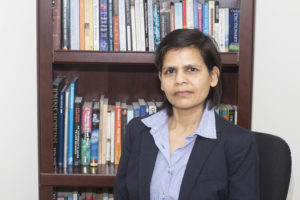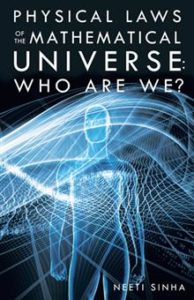The following are the words of Neeti Sinha, Archway Publishing author of “Physical Laws of the Mathematical Universe: Who Are We?” Learn more about about Neeti on her blog The Magnified Universe. To keep up with Neeti’s latest work, like and follow her on Twitter or Facebook. Download the Archway Publishing free publishing guide for more information on our supported self-publishing services.
Discovering a Passion
 I have always found science fascinating. My passion for the pursuit of knowledge started very early in life. During elementary school I began considering the complexities of our existence. I would wonder how we remained tethered to the earth while it zipped constantly in the sky. An insistence on communicating advancements to all audiences is a new aspect of scientific research and development that wasn’t part of the curriculum when I was in graduate school. Society is far more scientifically aware and curious than it was only a few decades ago. Thus, researchers can no longer huddle up in cozy alcoves sequestered from rest of the world. Rather, we scientists have a duty to spread our findings to the public in meaningful ways.
I have always found science fascinating. My passion for the pursuit of knowledge started very early in life. During elementary school I began considering the complexities of our existence. I would wonder how we remained tethered to the earth while it zipped constantly in the sky. An insistence on communicating advancements to all audiences is a new aspect of scientific research and development that wasn’t part of the curriculum when I was in graduate school. Society is far more scientifically aware and curious than it was only a few decades ago. Thus, researchers can no longer huddle up in cozy alcoves sequestered from rest of the world. Rather, we scientists have a duty to spread our findings to the public in meaningful ways.
Writing for the General Audience
A scientist can unknowingly carry the same potential as a journalist. This was a revelation which dawned on me as I contemplated writing a book focusing on the intricacies of physics and mathematics. A couple years later, I had in my hands an initial manuscript of my book. Eagerly, I sent out copies for review. Given its general scientific content, I was curious about what readers from non-science backgrounds would feel.
This is where I found myself confounded. The theories and concepts I find utterly beautiful didn’t seem to strike a chord with general readers. This is in no way their own shortcoming. Though from different backgrounds, many readers are eager to understand the ways of the universe and find joy in doing so. I imagine this is somewhat the same as how I relish the fineness of music, yet know nothing of how it is constructed. Non-industry readers weren’t able to fully enjoy the message of my book because the science didn’t translate.
Translating Complex Science
To explain what I mean by “the science didn’t translate”, see the following statement:
All non-trivial zeros of the zeta function have real part one-half.
Researchers and educators within the field find this mathematical phrase alluring. Known as the Riemann hypothesis, the expression itself has become a cliché. As trendy as it is, the hypothesis is quite complex in how it arrives and what it implies. For a reader from a different field, the statement is nothing but jargon. Not only is the hypothesis confusing for a general reader, but it’s quite far from aesthetically pleasing.
The explanation of this hypothesis requires dissection and sub-dissection of all the elements, followed by a sewing of multiple ideas into one smooth story line. Only after careful treatment can any beauty emerge from the Riemann hypothesis in the general reader’s view, an entire book could easily be dedicated to the process.
Learning on the Go
 After receiving the first round of feedback, I became dedicated to reconstructing my book with a more understandable tone. Following the most helpful suggestions: I cut large sentences into smaller ones and trimmed down on ultra-technical wording. I scaled down the scientific concepts I was hurling, even though it was difficult. The book got better, but it still wan’t “there” yet.
After receiving the first round of feedback, I became dedicated to reconstructing my book with a more understandable tone. Following the most helpful suggestions: I cut large sentences into smaller ones and trimmed down on ultra-technical wording. I scaled down the scientific concepts I was hurling, even though it was difficult. The book got better, but it still wan’t “there” yet.
Based on reader’s comments, the key struggle my book seems to face is intelligibility of the writing. The concepts read confusingly because they are complex and abstract, but I love it that way. Therefore, simplifying the content is easier said than done. Watering the science down beyond a point seems like dampening the beauty of it all. This is why I’m still working out exactly how I intend to depict more clearly the reflections of our universe.
It is a struggle, but I am trying.
Archway Publishing is always looking for content for its blog. If you’re an Archway Publishing author and would like to share an idea for a guest blog post, please tweet the Archway Publishing Twitter account @ArchwayPub or send us a message at the Archway Publishing Facebook page.

Pingback: True Beauty Resides in Fundamentals | The Magnified Universe: Cosmic Landscape in Quantum Décor
Pingback: Window of Mathematics: The Language of Prime Numbers | The Magnified Universe: Cosmic Landscape in Quantum Décor
Pingback: Math Shaped | The Magnified Universe: Cosmic Landscape in Quantum Décor